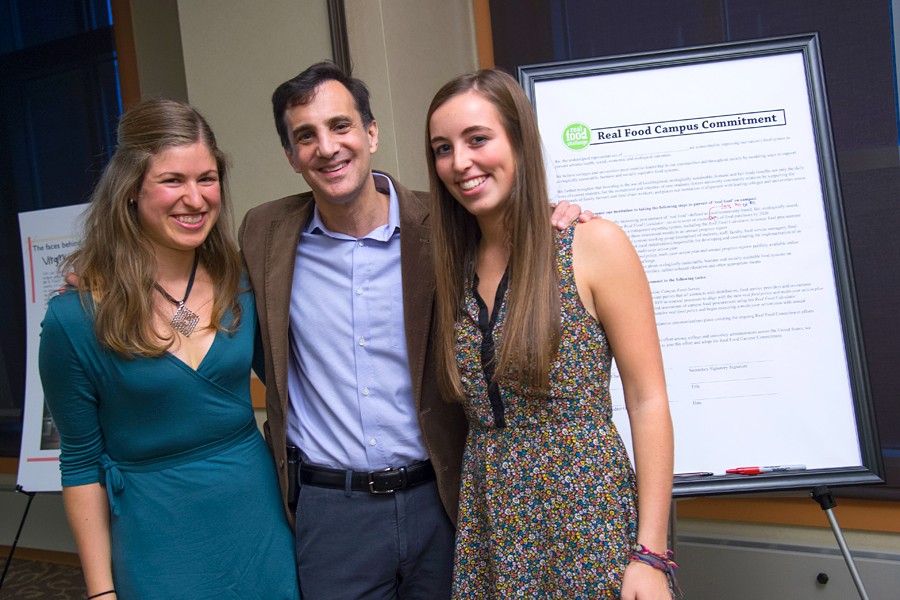At least 35 percent of food purchases for the Homewood campus will be local, sustainable, humane, and fair trade by 2020, the university has pledged.

Image caption: President Ronald J. Daniels signs the Real Food Challenge pledge, making Johns Hopkins one of the largest universities in the country to commit to it.
Image credit: JAY VANRENSSELAER/HOMEWOOD PHOTOGRAPHY
With this commitment, Johns Hopkins not only becomes one of the largest universities in the country to accept the Real Food Challenge, it exceeds the movement's recommended goal of 20 percent.
"This is a significant investment, not just in the health of our students, faculty, and staff but in the well-being of our city and region," university President Ronald J. Daniels says. "It demonstrates our commitment, as the city's largest private employer, to sustaining the community we call home."
Daniels signed the pledge Nov. 1 at the 100 Mile Meal, a newly initiated Homewood campus effort that will feature an all-local meal planned and prepared by students. This year's menu included maple-marinated salad using One Straw Farm's kale, white chicken chili made with Albright Farm's chicken, and apple crumble featuring Black Rock Orchard's fruit.
Johns Hopkins has already started stocking its Homewood dining halls with local products. Currently, 80 percent of the meat, including grass-fed beef, is locally purchased. All bread and rolls come from Baltimore's Stone Mill Bakery, and all milk from two Pennsylvania dairies. All salad greens are organic, and most come from Big City Farms, based in Baltimore. Canola oil is from Pennsylvania's Susquehanna Mills, which makes the oil from local seeds, collects used oil to convert to biodiesel fuel, and then sells it to the farmers who grow the canola seeds. And Baltimore chef Spike Gjerde of Woodberry Kitchen is supplying the campus with his locally made hot sauce and pickled vegetables.
A student organization, Real Food Hopkins, campaigned for the dining changes. Led by Raychel Santo, a senior double majoring in public health and global environmental change and sustainability, and Emily Nink, a senior majoring in global environmental change and sustainability and Spanish, the group has worked to make students aware of what they eat and where it comes from. Also, the group petitioned university administration to purchase more local food and started a community garden on Johns Hopkins' Eastern campus.
"It's exciting to see tangible change," Santo says. "When we leave Johns Hopkins, we'll know we made a difference."
Real Food Hopkins is a chapter of the national Real Food organization, which aims to get universities nationwide to shift from institutional food purchases to local and humane ones. The organization's goal is to convert $1 billion in such food buys by 2020.
Johns Hopkins is the 18th college to take the pledge.








